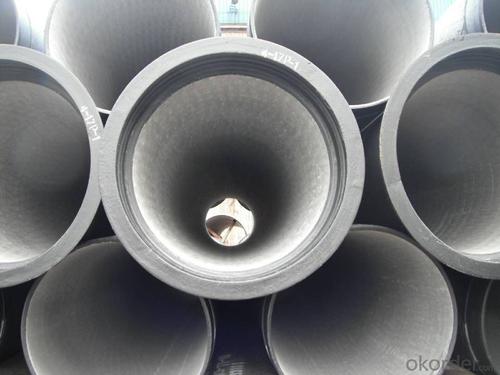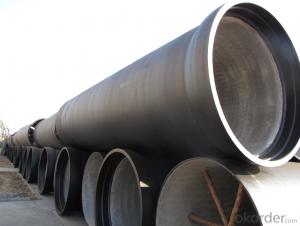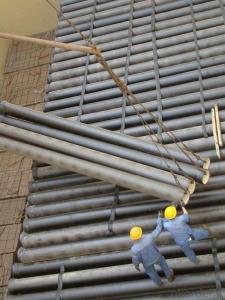DUCTILE IRON PIPE DN900 k9
- Loading Port:
- China Main Port
- Payment Terms:
- TT OR LC
- Min Order Qty:
- -
- Supply Capability:
- -
OKorder Service Pledge
OKorder Financial Service
You Might Also Like
Specification:
1) The standard of pipe: ISO2531:1998, K9
2) Effective length: 6m
3) Inner cement line: Portland cement line as per ISO4179
4) Zinc coating: at least 130g/m2 as per ISO8179
5) Bitumen painting: at least 70um as per ISO8179
6) With 100% quantity of NBR ring, or SBR ring, or EPDM ring as per ISO4633
7) DN80mm-800mm
8) High strength, lighter than grey iron, good corrosion resistance, no furring, small flow resistance, easy fixing, long life tome about 100 yeas
9) Produced by Hangzhou chunfeng machine
10) Checked by automatic inspection equipment
11) Composition:
Chemical composition | |||
Chemical composition | Ductile Cast Iron Pipe (%) | Grey iron pipe (%) | Steel pipe (%) |
C | 3.5-4.0 | 3.2-3.8 | 0.1-0.2 |
Si | 1.9-2.6 | 1.4-2.2 | 0.15-0.4 |
Mn | 0.15-0.45 | 0.4-0.6 | 0.3-0.6 |
P | ≤0.06 | ≤0.3 | 0.02-0.03 |
S | ≤0.02 | ≤0.1 | 0.02-0.03 |
Mg | 0.03-0.06 |
|
|
12) Feature:
Mechanical properties | |||
| Ductile Cast Iron Pipe | Grey Iron Pipe | Steel Pipe |
Tensile Strength(Mpa) | ≥420 | 150-260 | ≥400 |
Yield Strength(Mpa) | ≥300 | No Confirmation | No Confirmation |
Bending Strength(Mpa) | ≥590 | 200-360 | ≥400 |
Elongation (%) | ≥10 | Neglected | ≥18 |
Brinell Hardness(HBS) | ≤230 | ≤230 | About 140 |
13) T type mechanical joint
14) Packing: in bulk or container
- Q: It's not easy to drill ductile iron with cobalt high speed steel bit. Please help to point it out
- Determine the authentic M35 cobalt bit, which is about 65HRC in hardness. General workpiece hardness of about 45HRC or less of the problem.
- Q: How are ductile iron pipes protected against external corrosion?
- Ductile iron pipes are protected against external corrosion through the application of protective coatings such as polyethylene, epoxy, or zinc. These coatings act as a barrier between the pipe and the surrounding environment, preventing contact with corrosive elements such as water, soil, or chemicals. Additionally, cathodic protection techniques, such as sacrificial anodes or impressed current systems, may also be employed to further enhance the corrosion resistance of ductile iron pipes.
- Q: Can ductile iron pipes be used for trenchless installation methods?
- Yes, ductile iron pipes can be used for trenchless installation methods. Trenchless installation methods are techniques used to install underground pipes without the need for extensive digging or trenching. Ductile iron pipes are a strong and durable choice for these methods due to their high tensile strength and flexibility. They can be installed using various trenchless techniques such as horizontal directional drilling (HDD), pipe bursting, and slip lining. These methods allow for efficient and cost-effective installation of ductile iron pipes without disrupting the surrounding environment. Additionally, the corrosion resistance of ductile iron pipes makes them suitable for trenchless installations in various soil conditions and environments.
- Q: Can ductile iron pipes be used in areas with high groundwater levels?
- Indeed, areas with high groundwater levels can accommodate the use of ductile iron pipes. Renowned for their robustness, endurance, and anti-corrosion properties, these pipes prove themselves suitable for diverse purposes, such as water supply systems. Their structural integrity remains intact even when confronted with elevated groundwater levels. Additionally, the smooth interior surface of ductile iron pipes aids in sustaining optimal flow capacity while minimizing the likelihood of blockages or sediment accumulation. Thus, they offer a dependable option for regions with considerable groundwater levels, ensuring a durable and effective resolution for water distribution systems.
- Q: What are the common causes of failure in ductile iron pipes?
- Ductile iron pipes can fail for various reasons. Corrosion is a significant factor. When exposed to water, soil, and other environmental elements, rust and corrosion can develop on the pipe's surface. This weakens the pipe's structure and eventually causes failure. Improper installation or mishandling is another common cause. If the pipes are not correctly installed or if they sustain damage during transportation or installation, they may develop cracks, fractures, or other physical defects. These issues compromise the pipe's functionality and contribute to failure. Inadequate design can also lead to failure. When a pipe is not designed to withstand expected loads, pressures, or environmental conditions, it becomes vulnerable to premature failure. It is crucial to carefully consider material properties, wall thickness, and diameter during the design process to ensure the pipe can handle the demands placed upon it. Failure can also result from poor maintenance and delayed repairs. Regular inspections, maintenance, and timely repairs are essential for identifying and addressing issues before they worsen. Neglecting these measures can lead to the gradual deterioration of the pipe, increasing the likelihood of failure. Lastly, external factors such as soil movement, seismic activity, or excessive traffic loads can cause failure in ductile iron pipes. These forces exert stress on the pipe, resulting in cracks, fractures, or complete failure. To prevent failure in ductile iron pipes, it is crucial to employ proper corrosion protection techniques, adhere to correct installation procedures, consider design factors adequately, implement regular maintenance and repair programs, and account for external factors during the planning and installation process.
- Q: How do we handle the leaking of the ductile iron pipe?
- A hoop is a component that holds or ties another material with one material. It belongs to the fastener. The hoop holding device is composed of a hoop plate, a wing plate, a tension tie plate, a bolt and an inner liner. There are many kinds of hoop, hoop cable, wire rod hoop, hoop cable, wire hoop, stainless steel hoop are commonly used.
- Q: What is the expected maintenance for ductile iron pipes?
- The expected maintenance for ductile iron pipes typically includes regular inspections for signs of corrosion or damage, cleaning to remove any sediment or debris buildup, and occasional repair or replacement of sections that are worn or compromised.
- Q: How does ductile iron pipe perform in areas with high seismic activity?
- Ductile iron pipe is known for its exceptional strength and durability, which makes it well-suited for areas with high seismic activity. Seismic events, such as earthquakes, can subject pipelines to significant stress and strain, causing them to rupture or fail. However, ductile iron pipe has the ability to withstand these dynamic forces due to its unique material properties. One of the key advantages of ductile iron pipe in seismic areas is its superior flexibility. Unlike rigid materials such as cast iron or steel, ductile iron has a higher degree of elasticity, allowing it to deform and absorb energy during seismic events. This flexibility helps to dissipate the seismic forces, reducing the risk of pipe failure and minimizing damage to the overall pipeline system. Moreover, ductile iron pipe is manufactured with a high level of ductility, meaning it can undergo considerable deformation without fracturing. This property is crucial in seismic zones as it enables the pipe to withstand ground movements and seismic waves without compromising its structural integrity. The ability of ductile iron to absorb and redistribute stress also helps to prevent localized failures, ensuring the overall stability and reliability of the pipeline system. Additionally, ductile iron pipe is highly resistant to corrosion, which is especially important in high seismic areas where the integrity of the pipe may be compromised by ground movement and subsequent water leaks. The corrosion resistance of ductile iron ensures the longevity and reliability of the pipeline system, reducing the risk of leaks or failures during seismic events. In conclusion, ductile iron pipe performs exceptionally well in areas with high seismic activity due to its superior flexibility, high ductility, and corrosion resistance. These properties allow the pipe to withstand the dynamic forces generated during seismic events, providing a reliable and long-lasting solution for transporting fluids and ensuring the safety of communities in earthquake-prone regions.
- Q: How does ductile iron pipe handle ground movement and settlement?
- Ductile iron pipe is known for its excellent ability to handle ground movement and settlement. Due to its inherent strength and flexibility, it can withstand significant ground shifts without experiencing major damage or failure. One of the key features of ductile iron pipe is its high tensile strength, which allows it to withstand external forces and pressures. This strength enables the pipe to resist the effects of ground movement, such as soil settlement, subsidence, or shifting due to seismic activity. Moreover, ductile iron pipe has inherent flexibility, which allows it to absorb and distribute stress caused by ground movement. The pipe's flexibility helps to minimize the impact of settlement by allowing it to adjust and adapt to changes in the surrounding soil. This characteristic helps prevent the pipe from cracking, breaking, or leaking when the ground shifts or settles. Additionally, ductile iron pipes are often installed with flexible joints, such as push-on or mechanical joints, which further enhance their ability to accommodate ground movement. These joints provide a degree of flexibility and movement, allowing the pipe to adjust to changes in the soil without experiencing stress concentrations or structural failure. Furthermore, ductile iron pipe is highly resistant to corrosion, which is another important factor in its ability to handle ground movement and settlement. Corrosion can weaken pipes and make them more susceptible to damage during ground shifts. However, the corrosion-resistant properties of ductile iron help maintain the pipe's structural integrity and durability, even in challenging soil conditions. In summary, ductile iron pipe is well-suited to handle ground movement and settlement due to its high tensile strength, flexibility, and corrosion resistance. These properties allow the pipe to withstand external forces and adapt to changes in the surrounding soil, minimizing the risk of damage, leaks, or failure.
- Q: Can ductile iron pipe be used for water well applications?
- Yes, ductile iron pipe can be used for water well applications. Ductile iron has excellent strength, durability, and corrosion resistance, making it suitable for transporting water in various applications, including water well systems.
Send your message to us
DUCTILE IRON PIPE DN900 k9
- Loading Port:
- China Main Port
- Payment Terms:
- TT OR LC
- Min Order Qty:
- -
- Supply Capability:
- -
OKorder Service Pledge
OKorder Financial Service
Similar products
Hot products
Hot Searches
Related keywords



























